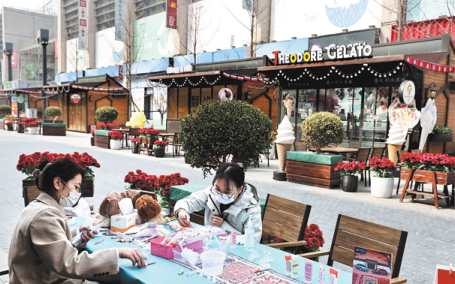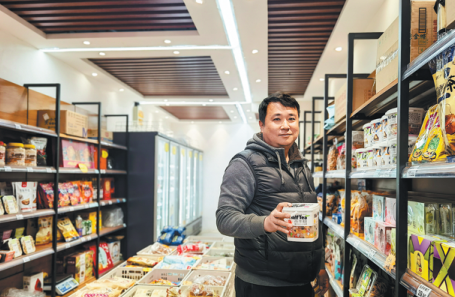Courtesy helps store prosper as trading activity rebounds
A grocery outlet has won through despite uncertain circumstances. Peng Yining and Li Peixuan report.

Editor's Note: Retailers and operators in the service sector are seeing business rebound as the economy picks up following the optimization of COVID-19 restrictions. China Daily profiles three small entrepreneurs who are looking forward to a return to pre-pandemic levels of activity.
Last year, in the depths of the COVID-19 outbreak, Ma Dali, a storekeeper in Beijing, volunteered to deliver goods to customers quarantined at home. When some of his other clients heard about it, they told the 41-year-old: "Dear me, you must be careful. Keep your distance from them and don't get infected." Some even said: "Oh my word! Just drop it. What if you get infected during a delivery? It's not part of your job."
However, Ma cared about his customers, so he insisted. The customers who had questioned him began to understand and said: "Well then, wear extra masks or gloves. Promise me you will be very careful."
As Confucius said, consideration for others is the basis of a good life and a good society. Ma's consideration for his customers deepened their relations and brought his new store great popularity in the midst of the epidemic. "The store is doing well. In the first year of operations, we made ends meet. The rent was covered by our profits from the second month," Ma said.
He and his wife opened the store on Feb 15 last year, when new cases were appearing sporadically, despite the zero-COVID policy. Many businesses were affected, and Ma's outlet — Delicious Food Corner, aka DFC — was no exception.
Buying goods from suppliers proved problematic, though, as many popular items from overseas such as frozen fish failed to clear customs because of the possibility that the packaging might carry the coronavirus. Moreover, many people were reluctant to visit the stores as they were wary of getting infected and also because of the need to scan the green QR code, which indicated health status.
Although Ma's store sold some imported goods, it wasn't too badly affected. "Maybe we earned something of a good reputation in the community. Some seniors would come in and buy goods without checking them closely. They just said: 'Let me have the bill. That's it. I have faith in your goods. Your store won't cheat customers.' Those words mattered a lot to me. It was worth all the effort," he said.
Allergy problem
Whenever Ma finds a new type of food product for DFC, he insists on tasting it to make sure it is delicious.
"Generally speaking, as long as the new product is not wrapped in a gift box, I must taste it myself," he said.
When some customers asked Ma why his jelly oranges always tasted better than other people's, he said, "It's because I taste them over and over again until I'm sure the product has no problems." When Ma goes to purchase fruit, regardless of whether it's freezing or raining, he always takes one of the items from the truck, wipes it clean and eats it. However, he is allergic to almost every fruit, so his taste test can cause problems.
"When I finish eating, my mouth goes numb. I can't even inhale deeply. Sometimes, it is really cold when I take fruit from the truck and eat it in the open air," he said. "In fact, I am allergic to all fruit except watermelons and oranges. After tasting, my throat becomes particularly sore and swollen, but I have to eat it. I must gauge its quality. It's not severe, though. After a while, not thinking about it and taking a rest, I gradually recover from the allergy.
"I have to do this for my store. Trust is the core of any business. The store will not survive without customers' trust in the long run."
Ma is a Beijinger, and the store is near his home. So, unlike some former shop owners on the same street who took the money and left after a year or two, he wants to gradually scale up the business and gain a foothold in the area. "The key to doing business is small profits, honesty and good service. High-quality goods, reasonably cheap prices. Don't deceive customers and always be considerate," he said.
Those qualities are the result of Ma's upbringing. He grew up in a courtyard for family members of Supreme Court employees, which was once the residence of Nian Gengyao, a renowned general during the Qing Dynasty (1644-1911).
Beijingers are famous for their elaborate formality. The family seniors teach children all kinds of formalities and etiquette, such as the correct greetings when meeting people you know, being trustworthy and reciprocal, and other positive things. So, from an early age, Ma learned how to be considerate and get along with other people, which has contributed to DFC's success.
"After all, the store is run solely by me and my wife, so we treat our customers very much like our parents. For example, no matter which one of us sees a senior pulling a trolley to the store or about to leave, we help take the trolley in or out. Consideration like that is a must. When selling boxes of food, if there is no handle, we use tape to make a handle for the customers to use. These kinds of small favors are countless," he said
Passing on profits
DFC is a community store for group purchases. Every day, Ma sends customers in his WeChat group a selection of discounted groceries and household items, usually 20 percent to 30 percent cheaper than other stores. Customers pay for the goods they want at the wholesale price via WeChat, and the orders are shared directly with the suppliers. The next day, the bulk order is delivered to the store for customers to pick up. This method of centralizing shipping and distribution greatly reduces the cost of last-mile delivery and overheads, creating cost savings that are passed onto the consumer.
The more Ma purchases, the bigger the discount he receives. Currently, there are four chain stores and more than 10 regular stores in Beijing whose owners buy together with Ma, making the unit price much lower than usual. The products are sourced directly from farmers, initial distributors and brands, who rent trucks and deliver the goods directly to the stores, cutting expenses from the middlemen in trade and transportation.
Moreover, the stores are in different districts, which means commodities overstocked in one store but selling well in another can be sent within an hour. The group-buying model solves problems of high logistics costs and low sales, making it a good choice for consumers.
"Business took off as people recovered from COVID-19. I aim to have 10 WeChat groups this year. Right now I'm running five groups, so I think my goals won't take long to achieve," Ma said.



Today's Top News
- China to implement zero-tariff policy for 53 African countries
- Xi sends congratulatory message to 39th African Union Summit
- China upgrades Xiong'an high-tech zone to national level
- Xi extends Chinese New Year greetings to ring in Year of Horse
- Country sees strong rebound in FDI
- Long March 10's booster retrieved from sea for 1st time






























